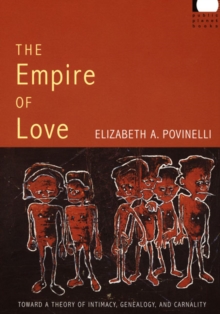
How to Be an Intellectual in the Age of TV : The Lessons of Gore Vidal PDF
by Frank Marcie Frank
Part of the Public planet books series
Description
Frank highlights the connections between Vidal's attitudes toward TV, sex, and American politics as they have informed his literary and political writings and screen appearances. She deftly situates his public persona in relation to those of Andy Warhol, Jacqueline Susann, Mary McCarthy, Susan Sontag, and others. By describing Vidal's shrewd maneuvering between different media, Frank suggests that his career offers a model to aspiring public intellectuals and a refutation to those who argue that electronic media have eviscerated public discourse.
Information
-
Download - Immediately Available
- Format:PDF
- Pages:172 pages
- Publisher:Duke University Press
- Publication Date:25/10/2005
- Category:
- ISBN:9780822387152
Information
-
Download - Immediately Available
- Format:PDF
- Pages:172 pages
- Publisher:Duke University Press
- Publication Date:25/10/2005
- Category:
- ISBN:9780822387152










